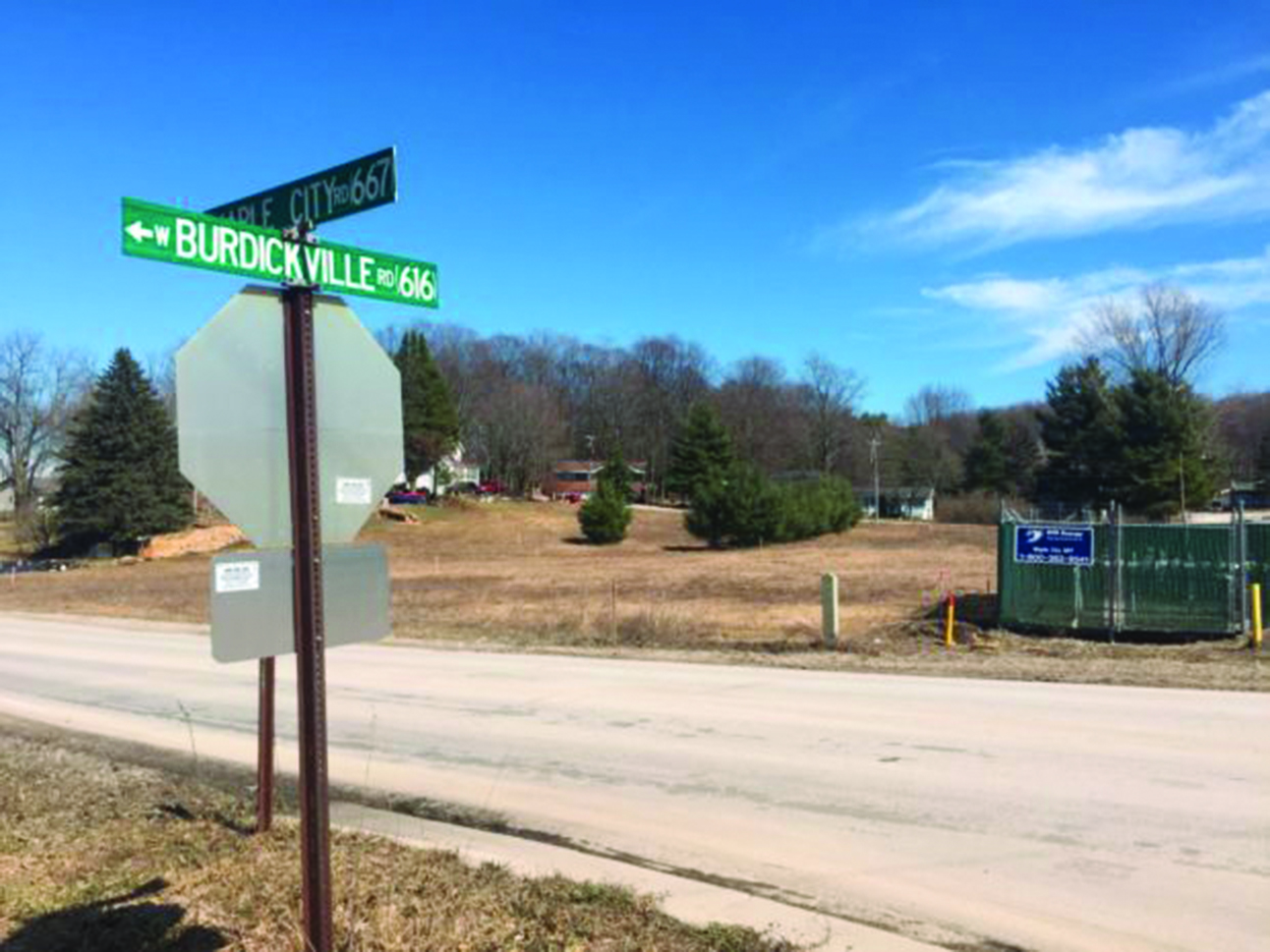Lake Ann and Maple City residents win battle with hungry national chain
By Jacob Wheeler & Aubrey Ann Parker
Current Contributor & Editor
“There are some people who were upset. A lot of them regularly came to our meetings,” Amy Ferris, supervisor for Crystal Lake Township, told the Benzie County Record Patriot back in April 2016. She was referencing the construction of a Dollar General very close to the iconic Gateway Arch atop the hill going out of the City of Frankfort. But there was nothing in the township’s ordinances that would prevent such a development.
Nearly a decade ago, Benzie County went from a county-wide zoning model to one in which each township, village, and city would administer its own zoning and planning. While the city’s zoning would have required the construction of a two-story building, the rules in Crystal Lake Township—just a few hundred yards from the city line—were looser, and thus the developers found it more appealing.
Now, three years after the construction of that Dollar General store, citizens of other small towns in the area are learning how to deal with when a national corporation comes knocking.
Over the past two months, the alarm has been sounded in Lake Ann and Maple City. The prospect of a small-box chain moving into these tiny communities drew swift, near-unanimous opposition from local citizens who packed Almira and Kasson township meetings, respectively.
And sure, letters to the editors of local papers, blasts on social media platforms, and showing up to/speaking out at a township meeting are all well and good; but the real results come from good, thorough zoning laws—and then holding elected officials responsible for upholding them.
Maple City Says “No”
Maple City resident Scott Mills—who lives on South Maple Street, next to three adjacent vacant lots at the northeast corner of County Roads 667 and 616—spent the month of April organizing neighbors, business owners, and concerned residents to convince Kasson Township officials to stop a dollar store from moving into their town.
Mills, who grew up in Maple City, grew suspicious on March 27 and 28, when he saw surveyors from Difflin-Umlor marking corners of the three adjacent lots that sit in a mixed-use commercial district which allows for retail businesses. He met the surveyors, spent hours researching, and spoke with Kasson Township zoning administrator Mike Lanham, who confirmed that he had seen preliminary site plans submitted in December 2018 for a “Dollar General-type store.”
Then, on April 8, Mills saw a worker from an engineering firm in Traverse City marking points for soil borings to test soil composition on the property. The worker confirmed to him that Midwest V, LLC, based in Spring Lake near Holland, was seeking to build a Dollar General on the land.
“I see Dollar General’s business as moving into places where there are a couple local grocery stores and they put them out of business,” Mills says. “Dollar General doesn’t sell fresh foods. This would threaten our local stores and pose an existential threat to Gabe’s [Country Market]. Local businesses add value by keeping dollars in our community.”
“I don’t think it’s a good idea,” says Kathy Gabourie, who has owned Gabe’s Country Market together with her husband, Mike, for 34 years. “Naturally it would affect our business. This community is too small for it.”
Likewise, other Maple City business owners were unhappy to learn that a dollar store could be targeting their village.
“It doesn’t fit the landscape of our small, close-knit community,” says Mary MacDonald, who owns Pegtown Station, a popular restaurant just a block away from the potential Dollar General site. “We need to band together and keep our eye on this, so we don’t let things slide through. I personally wouldn’t shop there. I’d rather go to Gabe’s or Bunting’s [in nearby Cedar] or Anderson’s [in Glen Arbor]. If I need milk, I’ll walk across the street to Gabe’s. We have a great relationship with them.”
After learning all that he could about the potential project, Mills then organized the community to pack subsequent Kasson Township meetings: in an online letter, he encouraged concerned residents to speak during the public comment period at a township board meeting that was held on April 9. But the alleged development was not on the official meeting agenda, because the board would not speculate on plans that had not been submitted yet.
In other words, though the developer had submitted preliminary site plans last December, and again last month, to the township, no formal application was ever made, according to Lanham and Dana Boomer, Kasson Township’s planning commission chair.
“They’d have to abide by our size, setback, and sign regulations,” Boomer says of any development that would take place on the three adjacent lots. “They’d have to go through site plan reviews.”
Kasson Township stipulates that a development within its mixed-use commercial core not exceed 16,000 square feet (page 42 in its Zoning Ordinance). A Dollar General building, which averages 9,100 square feet, would have exceeded 16,000 square feet when its 25 to 30 parking spaces, plus a wastewater and easement footprint, were taken into account.
Ultimately, the developer working on behalf of Dollar General has, as of May 10, withdrawn its offer to purchase the three Maple City lots from the Flaska family, according to realtor Deb Brown, a broker for Home Port Network who represents the family.
However, Brown said that Kasson Township zoning laws—rather than citizen opposition—prompted the developer to withdraw its offer. Brown said that Kasson refused to allow the developer to merge the three lots, thereby tripling the allowed size.
Brown relayed that the Flaskas—whose family has lived in Maple City for decades—are disappointed that the offer was withdrawn.
“They thought it would have been good for the community,” she says. “People could buy things without having to drive all the way to Traverse City.”
She followed that with a written statement: “The Kasson Zoning ordinance calls for a commercial corridor downtown; the Leelanau County Master Plan calls for commercial growth within the current towns to avoid commercial sprawl along the feeder highways. The lots owned by the Flaska family are commercially zoned, and they feel more retail is needed in downtown Maple City to help keep the city viable and energized.”
With Dollar General now out of the picture, but with the Flaskas’ land still for sale, Brown opined that the kind of “mom-and-pop” store allowed in Kasson’s zoning regulations might not be feasible in Maple City.
“While the zoning for small-footprint stores is felt to keep a form of ‘character’ and small-town feel, they are not economically feasible,” she wrote. “What kind of products would have to be sold in a 2,000- [to] 4,000-square-foot store to bring in enough income to pay for the new building, taxes, stock, and wages? These are tough questions for a potential buyer of any small-town commercial business. When a new retail buyer has researched this as a viable possibility, they should be given the chance to work out a plan within that community that would prove mutually beneficial.”
Meanwhile, after learning of the withdrawal at a Kasson Township board meeting on May 14, Scott Mills emailed the fellow citizens who had signed an open letter opposed to Dollar General last month. His words adopted the form of a victory letter for his campaign:
“There will be no Dollar General in our town! Not on this particular land at least… As I look out the window now, the pink flags marking the planned soil borings that were never done swish idly in the breeze. An oriole sings from the top of a white pine… There’s no way to know how this would have unfolded had we not come together as a community and responded with a firm and well-reasoned ‘No,’ but the situation was certainly resolved exactly how we asked that it be. And swiftly, too. I suspect that our unified response had a decisive effect…”
Dollar Stores In Small Towns
Dollar stores—which include Dollar Tree, Family Dollar, and Dollar General—are expanding in rural, and often economically depressed, towns throughout the United States.
As of July 2018, Dollar General alone operated 15,000 stores across the 48 contiguous United States—they are now more numerous than McDonald’s restaurants. Dozens are strewn across northwest lower Michigan; for instance, Dollar General has locations currently in Buckley, Frankfort, Grawn, Interlochen, Kalkaska, Kingsley, and Traverse City, to name a few that are nearby.
“My fear about such an enterprise in this village is that they are not flexible with their 9,100-square-foot store (size),” resident Mary Sharry told the Leelanau Enterprise back in 2015 of the possibility of a dollar store being built in Empire. “Another concern is that, if such a business comes into an area and doesn’t succeed, they have no compunction about closing up [their store]. They simply pull out of town and leave a structure there, which could become a derelict building over time. Empire sure doesn’t need more of that.”
While the 2015 bid to acquire land and open a dollar store on M-22 north of Empire failed when residents revolted—more than 70 residents signed a petition opposing the development—and the village council voted unanimously against changing zoning laws that would have allowed for the development, Dollar General was able to land a foothold next to the gateway arch just outside of Frankfort in 2016, after securing approval from Crystal Lake Township.
Dollar General had initially wanted to put a store on the east end of Main Street in Frankfort, but that proved too difficult when city officials made it clear that zoning laws would not be bent to accommodate the store’s cookie-cutter model. Just as in the case of Maple City, a formal proposal was never made to the City of Frankfort, because it never got that far.
“I communicated with a person who [Dollar General] had sent to look at sites, and we had a lengthy conversation about our zoning,” says Josh Mills, city manager for Frankfort. “For vacant lots in our commercial corridor, we require a minimum of 30-foot height, which promotes two-story structures—we do allow for three-story, also—so our zoning required two stories, unless they bought an existing structure. We encouraged them to build workforce housing in the second floor, or maybe condominiums that could be sold. Or they could have bought an existing structure: the [former Honor Frankfort Onekama] building supply store was for sale at the time. All of those concepts could have been adapted or reused for the purpose of a Dollar General. But that is when they found the site in Crystal Lake Township.”
In other words, when zoning got tough within the City of Frankfort, Dollar General found a site just outside of the city lines, in Crystal Lake Township, where the zoning laws were not as strict.
Lake Ann Moratorium
Lake Ann Brewing Company owner Matt Therrien says that he was also contacted in March by a downstate realtor with a Lansing-area phone number who has a PO Box in Frankfort and is a member of the Benzie County Chamber of Commerce. The realtor inquired about a commercially zoned piece of land that Therrien owns, located about a half-mile from downtown Lake Ann. Therrien received a high offer for the land but was wary of selling to an anonymous corporation that refused to disclose its identity.
Therrien returned the realtor’s call and said something to the effect of: “If this is a Dollar General or Family Dollar, we’re not interested in selling.” Therrien recalls that a 10-second pause ensued, then the realtor replied, “I’ll let the buyers know.” Two hours later, he received a text stating that “the buyers find these terms unusual and wish to withdraw their offer.”
The same realtor later inadvertently called Therrien’s cell phone number while pursuing other Lake Ann residents about their commercial properties.
“Without knowing who I’m selling to, I’d have to deem it a good fit for my town before I’d get on board,” Therrien says. “It would otherwise reflect poorly on me, and my beer might not taste as good as before, if you know what I’m saying.”
John Nuske, who owns Lake Ann Grocery, was also alarmed to hear of a dollar store’s interest.
“Yes, Dollar General would provide competition for my business,” he says. “But all they do is add some convenience stuff at convenient hours. They might be able to beat me at the price of milk and eggs, but all they’ll have is cheap [stuff] made in China.”
In the end, at a special meeting on April 17, Almira Township instituted a 60-day moratorium on any commercial development to give the Planning Commission the opportunity to review its zoning ordinance and potentially limit the size of commercial development in the municipality, which includes Lake Ann. This moratorium will end in mid-June.
“We don’t want to discourage growth in the township, but we want it to be growth the township wants, as represented by our constituents,” says Therrien, a township board member. Therrien emphasized that local zoning is what decides what development is and is not allowed, not community activism.
A version of this article was first published in the Glen Arbor Sun, a semi-sister publication to The Betsie Current. The Glen Arbor Sun has continued to report on this topic throughout 2019, from April through September. Read that coverage here.




